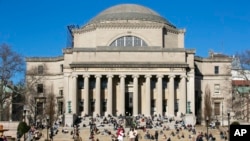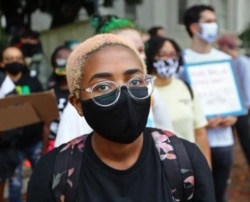Student Union
Cancel Culture Divides Students, Professors

Arianna Mbunwe said she was fed up when her school appeared to remain silent last year during protests that followed the death of African American George Floyd in police custody in Minnesota.
Mbunwe, a junior at the University of Georgia (UGA), ignited a debate over so-called "cancel culture" when she opened a Twitter account called "ariexposesuga" to call attention to what she perceived as racially offensive incidents on campus.
In September 2020, she posted screenshots of messages from a group chat among University of Georgia Lambda Chi Alpha fraternity members. One fraternity brother posted: "Lord give me the strength to not call that woman [Mbunwe] a racial slur."
The fraternity chapter self-suspended indefinitely in response.
"I just wanted people to realize what they were doing was wrong and change their behavior for the better," Mbunwe said through email. "Sometimes it worked and sometimes it didn't, but that's their own free will."
Not all of Mbunwe's classmates saw it that way. Some accused Mbunwe of perpetuating cancel culture, a pattern of ostracizing, boycotting and publicly shaming people or organizations over perceived offenses.
"It created, especially at UGA, an anti-cancel culture," said sophomore Patrick Mosley, political affairs director of his school's chapter of College Democrats. "Especially if you're outside of that more liberal sector of UGA."
Meredith Clark, assistant professor in the Department of Media Studies at the University of Virginia-Charlottesville, defends cancel culture as "an expression of agency, a choice to withdraw one's attention from someone or something whose values, (in)action, or speech are so offensive, one no longer wishes to grace them with their presence, time, and money," she wrote in the journal Communication and the Public in October 2020.
But canceling, which usually targets celebrities, politicians and companies, tends to drive a wedge between progressive liberals and social conservatives, according to Pippa Norris of Harvard University's Kennedy School of Government.
"The public outing of heretics and dissenters is nothing new, as exemplified by the fanatical prosecution of religious nonconformists, the medieval punishment by stocks and pillory in the town square, or the notorious Salem witch trials," Norris wrote in August 2020.
In today's context, there is genuine concern if legitimate criticism has morphed into "a tidal wave eroding tolerance of … free speech, and enforcing a progressive or left-wing orthodoxy among professors, administrators, and student," she continued.
"But is there evidence, beyond some specific anecdotes, that this has actually occurred?"
Poll: Threat to freedom
A majority of Americans — both liberal and conservative — think so: A new Harvard CAPS-Harris poll shared exclusively with The Hill newspaper found 64% of Americans perceive cancel culture as a threat to freedom. Many students complain on social media that cancel culture has gone too far, dividing people on lines of race, gender, political views, age and class.
Mimi Groves, an incoming freshman at the University of Tennessee-Knoxville, was pressured to withdraw after a Snapchat video circulated of her when she was 15, using a word considered a racial slur. The video was three seconds long and three years old.
The controversy didn't erupt until May 2020 when Groves urged people in a tweet to "protest, donate, sign a petition, rally, do something" in support of the Black Lives Matter movement, as reported by The New York Times. A former classmate objected to her tweet, citing the three-year-old slur, and recirculated the video.
Groves was swiftly removed from her university's cheer team and soon withdrew from the school after receiving pressure from admissions officials, she told The New York Times. VOA's attempts to reach her were unsuccessful.
Professors also get canceled, critics say.
Georgetown Law School fired adjunct professor Sandra Sellers in March over a widely viewed video that showed her making what were considered racially insensitive comments about her Black students.
And at Duke University in North Carolina, biostatistics professor Megan Neely was forced to resign in January 2019 after an outcry ensued over an email she sent, asking Chinese international students to speak English in department buildings.
'No room for discussion'
Some students say their political beliefs will get them canceled for being in the minority on college campuses, which have largely leaned liberal and Democrat.
"It's not an explicit cancel culture, like Twitter going after a person, but a social cancel culture where if you're a conservative, we're not going to support you or hear out your ideas," said Andrew Waldman, a Pennsylvania State University freshman involved with his campus's College Republicans.
"You'll see people isolate conservatives and refuse to work with conservatives because they are conservative and no other reason," he said. "That's one of the issues with cancel culture, in my opinion: It's canceling their ability to help students."
Dan Mills, a freshman at the University of Massachusetts Amherst and communications director of College Republicans, said he is also discouraged by cancel culture on his campus.
"I'll be in a class and I'll have an idea that I want to say, but I'll think it's something that I can't say in a Zoom of 150 people," Mills said. "So, it can be frustrating because you hear the same ideas over and over again in the class, and there's really no room for discussion of it. Sometimes even if I really want to say something, I will, but I'll really have to skirt around what I want to say and leave people to figure it out."
Waldman said his philosophy is that "if you don't like what someone is saying, then you should engage in a discussion with them. To prevent that conversation from happening in the first place is how you get an ignorant and uninformed population, and I think that's one of the things that causes the political polarization that happens in our society today because we're not allowed to have those discussions."
Florida bill
In response to fears of "cancel culture" in higher education, the Florida House of Representatives passed a bill in late March that would require institutions to survey "viewpoint diversity" on their campuses and prohibit universities from banning controversial speakers. Opponents, including university faculty leaders, fear a "chilling effect" on campus speech.
While most Americans see "cancel culture" as a problem, according to the Harvard poll, there is disagreement about how to curtail it.
"In most instances of cancel culture that we see, these people are good people and they make a mistake," said Waldman. "The questions should be, 'How can we help these people and teach them that saying things like this isn't OK anymore?' and, 'How can we expand the conversation without closing it down?"
Others see exposing wrongdoing through social media as a means to bring about social justice. While Mbunwe says she does not see her posts as "canceling" anyone, she says that she uses her platform to bring awareness to social justice and health and safety issues that impact her community.
"The people who complain about cancel culture are those who are scared of accountability and are scared they are going to have some of their past mistakes brought to light," Mbunwe said. "Instead of welcoming accountability, a lot of people are scared of it, and I think that needs to change."
See all News Updates of the Day
- By VOA News
Michigan State international students get their own space

Michigan State University in East Lansing, Michigan, is setting aside a space in the International Center for international students.
Nidal Dajani, vice president of the school's International Student Association, said that the club plans to use the space to host events and hopes to collaborate with other student groups.
- By Dylan Ebs
International students find community during Pride Month

For LGBTQ+ international students, Pride Month, observed in June, is a unique time to reflect.
They hold on to multiple identities — both their LGBTQ+ identity and their cultural background — but coming to terms with them is not always easy.
For graduate student David Zhou, these identities can feel conflicting as transgender rights in China remain a controversial issue and spaces for LGBTQ people close. Zhou, 25, is transgender and pursuing an education in the STEM field at an urban university in the Midwestern United States.
VOA is using a pseudonym for Zhou’s first name and is not naming his university to protect his identity due to safety concerns back home in China. Zhou is not open about his transgender identity to his family.
During Pride Month, Zhou said he attended multiple LGBTQ+ events in his community and is surrounded by a supportive group of LGBTQ+ students who can relate to his experiences. But he’s not open about his identity to everyone on campus and said he doesn’t disclose his preferred pronouns to everyone to avoid transphobic comments.
“I feel like I have to make some judgments of the character of that person to see if they’re a good person to disclose [my identity] to,” Zhou said.
Zhou’s Pride Month celebrations included attending local markets with LGBTQ+ vendors and hanging out with his LGBTQ+ friends.
“They normalized being trans and for a long time I feel like trans identity is, should I say a vulnerability, brings me fear and worrying about discrimination, but having those events are helpful because it allowed me to see that queer people could just [live] openly,” he said.
At social events where few international students are present, Zhou said it can be tough to fit in.
“There's a lot of times like when they were talking about things I kind of, don't really understand, mostly because I kind of lack some background experience or knowledge,” he said.
Zhou said he is not aware of specific groups for LGBTQ+ international students at his university, but said international students are more prevalent in graduate programs and therefore find representation in organizations for LGBTQ+ graduate students.
In China, transgender individuals must obtain consent from an “immediate family member,” even for adults hoping to transition, which critics say limits the autonomy of transgender individuals while supporters say the policy protects doctors from violence by upset parents.
Struby Struble, a former coordinator of the University of Missouri LGBTQ+ Resource Center, told NAFSA: Association of International Educators in 2015 that LGBTQ+ international students face a “double barrier” on campus.
“With their international student friends, they feel isolated because they’re the LGBT one,” she said. “But then among the LGBT students on campus, they feel isolated because they’re the international one.”
Nick Martin, associate director of the Q Center, Binghamton University’s LGBTQ+ student support office, said when international students tour the center, there’s often a sense of hesitation as they enter a type of space that may not be present in their home country.
“I compare that to a year in after they've come into the space, they've again, maybe come to some of our events, they've got more connected,” he said.
Martin said graduate students have a unique interest in the Q Center as they may use the office for research and advocacy purposes that align with their studies.
“For older students, there may be hesitancy in a different way, but I think it's more in the vein of they want to do some of the advocacy work,” he said.
Martin said he thinks about how both his office and BU’s international student office can support students who come from countries with few — if any — protections for LGBTQ+ individuals.
“It's been a learning process of what those students really need, but I think I've kind of learned that a lot of students are just looking for the safe space that we offer,” Martin said.
- By VOA News
International students discuss US campus culture shock

International students at De Anza College in Cupertino, California, talked about culture shock in an article in La Voz News, the student newspaper.
"It felt like a major culture shock. Everything was so different, from academics to mannerism," said a student from Mexico.
Read the full story here.
These are the most expensive schools in the US

High tuition costs along with housing and food expenses can add up for students at U.S. colleges and universities.
MSNBC looked at the most expensive schools in the country, with one costing more than $500,000 for a bachelor’s degree. (June 2024)
Uzbekistan students admitted into top US universities

Students from Uzbekistan are among the international students admitted to top colleges and universities in recent years.
Gazata.uz profiled some of the Uzbekistan students attending Harvard, Brown, Princeton and other U.S. universities. (June 2024)








